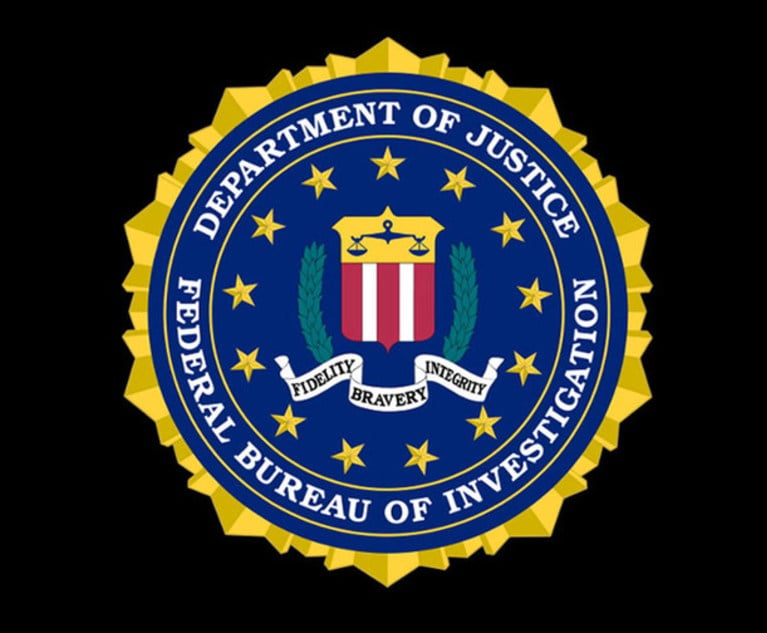Justices Soon Will Face Hard Questions, More Controversy, When Texas Abortion Ban Returns
The Texas law banning abortions after six weeks will swiftly return to the U.S. Supreme Court, once again thrusting the justices and their so-called shadow docket into the public sphere.
October 07, 2021 at 05:21 PM
5 minute read
 Demonstrators for and against abortion rights outside the U.S. Supreme Court on the day of arguments in the "Whole Woman's Health v. Hellerstedt" case March 2, 2016. Photo: Diego M. Radzinschi/ALM
Demonstrators for and against abortion rights outside the U.S. Supreme Court on the day of arguments in the "Whole Woman's Health v. Hellerstedt" case March 2, 2016. Photo: Diego M. Radzinschi/ALM
The Texas law banning abortions after six weeks will swiftly return to the U.S. Supreme Court, once again thrusting the justices and their so-called shadow docket into the cauldron of public debate, according to legal scholars and others.
When the case initiated by the U.S. Justice Department's lawsuit against Texas arrives at the Supreme Court, the justices likely won't face the constitutionality of the law itself, but another set of complex procedural questions in another emergency application by whoever loses in the lower appellate court.
The justices' use of their emergency docket, or shadow docket, has come under increasing scrutiny as they recently have acted on controversial issues, such as abortion, evictions, COVID-19 restrictions and immigration.
U.S. District Judge Robert Pitman of the Western District of Texas on Wednesday night issued a preliminary injunction temporarily blocking the Texas abortion law in the case, United States v. Texas. State officials already have filed a notice of appeal with the U.S. Court of Appeals for the Fifth Circuit.
When the case gets to the Supreme Court—and court watchers agree it is "when," not "if"—the justices will be seeing the law for the second time. On Sept. 1, a 5-4 majority in an unsigned order rejected abortion providers' request to stop the law from taking effect pending their appeal in the Fifth Circuit in the case Whole Woman's Health v. Jackson. The Fifth Circuit, which had refused to block the law, is not expected to hear that appeal before December.
The high court's majority in September said it was not expressing a view on the law's constitutionality, only that there were "complex and novel antecedent procedural questions," which did not justify blocking the law. Chief Justice John Roberts Jr. dissented, saying he would temporarily halt the law to allow the lower courts to consider those questions. Justices Stephen Breyer, Sonia Sotomayor and Elena Kagan also dissented.
Raffi Melkonian, an appellate partner at Houston's Wright Close & Barger, said he expects the Fifth Circuit to move quickly on the state's appeal of Pitman's injunction in the United States' suit.
"I can imagine Texas filing its motion for a stay, a very fast response, and an administrative stay being granted either later today or in the morning, if the panel is inclined that way," Melkonian said. "The panel could grant an administrative stay and then set up a briefing deadline for the real stay and make a decision pretty quickly. I think they would know what they're going to do by early next week."
Melkonian noted that Texas has asked the court for the same motions panel of judges that is handling the pending appeal in Whole Woman's Health. "I don't think you can ask for that and I'd be quite surprised if the same panel picked it up," he said.
The Supreme Court already has a major anti-abortion law scheduled for argument Dec.1. That case, Mississippi v. Dobbs, asks the justices to uphold the state's 15-week abortion ban and to overrule its landmark abortion rights precedents, Roe v. Wade and Planned Parenthood v. Casey.
"I don't think the court is going to decide the constitutionality of the six-week law before it decides the constitutionality of the 15-week law," Irving Gornstein, executive director of Georgetown University Law Center's Supreme Court Institute, said.
And the Dobbs decision will matter, Erwin Chemerinsky, dean of the University of California Berkeley School of Law, said. "It is there that the court will overrule or modify or reaffirm Roe v. Wade," he said.
When the justices get the United States' case out of Texas, Gornstein and Chemerinksy agreed the legal questions would be procedural, much as the issues were in the justices' September action.
"The key issues are whether the United States has standing to sue and whether there is a cause of action for it to sue under," Chemerinsky said. "The district court is very thorough on these questions, but they are hard questions. I assume if the Supreme Court comes out the other way it will be on these issues."
And if the justices do disagree with the district court, he added, "that will be taken as a clear signal of five justices who do not want to block laws restricting abortions. If they allow the preliminary injunction to stand, it will lead to speculation about whether there is a majority to overrule Roe."
Some high court action is inevitable on the United States' case, Melkonian said. "They're going to have to do something about it because it is coming, one way or another."
Read more:
Federal Judge Temporarily Blocks 'Flagrantly Unconstitutional' Texas Abortion Law
Meet the Judge Thrust Back Into the Texas Abortion Battle: Robert Pitman
Judge Presses Texas Lawyers on 'Unusual' Enforcement Mechanism in State's Abortion Law
Partisan Divide Dominates 'Shadow Docket' and Texas Abortion Ban Hearing
This content has been archived. It is available through our partners, LexisNexis® and Bloomberg Law.
To view this content, please continue to their sites.
Not a Lexis Subscriber?
Subscribe Now
Not a Bloomberg Law Subscriber?
Subscribe Now
NOT FOR REPRINT
© 2025 ALM Global, LLC, All Rights Reserved. Request academic re-use from www.copyright.com. All other uses, submit a request to [email protected]. For more information visit Asset & Logo Licensing.
You Might Like
View All
What’s at Stake in Supreme Court Case Over Religious Charter School?

Supreme Court Agrees to Hear Lawsuit Over FBI Raid at Wrong House

Trump Seeks Pause of Supreme Court Cases, Disavows DOJ Stance on Voting Rights Act
Trending Stories
- 1Uber Files RICO Suit Against Plaintiff-Side Firms Alleging Fraudulent Injury Claims
- 2The Law Firm Disrupted: Scrutinizing the Elephant More Than the Mouse
- 3Inherent Diminished Value Damages Unavailable to 3rd-Party Claimants, Court Says
- 4Pa. Defense Firm Sued by Client Over Ex-Eagles Player's $43.5M Med Mal Win
- 5Losses Mount at Morris Manning, but Departing Ex-Chair Stays Bullish About His Old Firm's Future
Who Got The Work
J. Brugh Lower of Gibbons has entered an appearance for industrial equipment supplier Devco Corporation in a pending trademark infringement lawsuit. The suit, accusing the defendant of selling knock-off Graco products, was filed Dec. 18 in New Jersey District Court by Rivkin Radler on behalf of Graco Inc. and Graco Minnesota. The case, assigned to U.S. District Judge Zahid N. Quraishi, is 3:24-cv-11294, Graco Inc. et al v. Devco Corporation.
Who Got The Work
Rebecca Maller-Stein and Kent A. Yalowitz of Arnold & Porter Kaye Scholer have entered their appearances for Hanaco Venture Capital and its executives, Lior Prosor and David Frankel, in a pending securities lawsuit. The action, filed on Dec. 24 in New York Southern District Court by Zell, Aron & Co. on behalf of Goldeneye Advisors, accuses the defendants of negligently and fraudulently managing the plaintiff's $1 million investment. The case, assigned to U.S. District Judge Vernon S. Broderick, is 1:24-cv-09918, Goldeneye Advisors, LLC v. Hanaco Venture Capital, Ltd. et al.
Who Got The Work
Attorneys from A&O Shearman has stepped in as defense counsel for Toronto-Dominion Bank and other defendants in a pending securities class action. The suit, filed Dec. 11 in New York Southern District Court by Bleichmar Fonti & Auld, accuses the defendants of concealing the bank's 'pervasive' deficiencies in regards to its compliance with the Bank Secrecy Act and the quality of its anti-money laundering controls. The case, assigned to U.S. District Judge Arun Subramanian, is 1:24-cv-09445, Gonzalez v. The Toronto-Dominion Bank et al.
Who Got The Work
Crown Castle International, a Pennsylvania company providing shared communications infrastructure, has turned to Luke D. Wolf of Gordon Rees Scully Mansukhani to fend off a pending breach-of-contract lawsuit. The court action, filed Nov. 25 in Michigan Eastern District Court by Hooper Hathaway PC on behalf of The Town Residences LLC, accuses Crown Castle of failing to transfer approximately $30,000 in utility payments from T-Mobile in breach of a roof-top lease and assignment agreement. The case, assigned to U.S. District Judge Susan K. Declercq, is 2:24-cv-13131, The Town Residences LLC v. T-Mobile US, Inc. et al.
Who Got The Work
Wilfred P. Coronato and Daniel M. Schwartz of McCarter & English have stepped in as defense counsel to Electrolux Home Products Inc. in a pending product liability lawsuit. The court action, filed Nov. 26 in New York Eastern District Court by Poulos Lopiccolo PC and Nagel Rice LLP on behalf of David Stern, alleges that the defendant's refrigerators’ drawers and shelving repeatedly break and fall apart within months after purchase. The case, assigned to U.S. District Judge Joan M. Azrack, is 2:24-cv-08204, Stern v. Electrolux Home Products, Inc.
Featured Firms
Law Offices of Gary Martin Hays & Associates, P.C.
(470) 294-1674
Law Offices of Mark E. Salomone
(857) 444-6468
Smith & Hassler
(713) 739-1250









